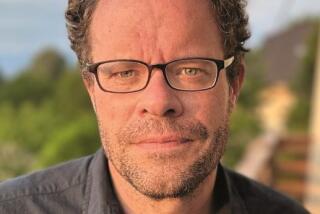TWO GUYS FROM VERONA: A Novel of Suburbia.<i> By James Kaplan</i> .<i> Grove/Atlantic: 320 pp., $24</i>
- Share via
Joel and Will are the two guys of suburbia: 43-year-old buddies and former high school jocks (tennis, not football). Joel lives at home with his mom and works behind the counter at a sub shop. Will lives at home with his unlovable wife and two unlovely children and ineptly manages his father’s cardboard box business. Joel is consumed by a longing for his past, Will with a longing for the future.
Joel lost his perfect high school sweetheart to mental illness, his sweetly athletic brother to an early death and his own balance to a nervous breakdown. He sits naked outside his former sweetheart’s abandoned house, talks with his dead brother and dematerializes the present into the colors and smells of the past. Will dreams of selling off the box business, making a pile of money and acquiring a better car, a better tennis serve and the sex he never had in high school. Joel drinks Wild Turkey and takes long drives in his 1974 Impala to memorialize the past. Will joins him to escape his wife and kids.
This is a man’s life in well-heeled Verona, hometown of a monstrously ordinary guy-ness, where women are seen only as cunning, married tramps, clueless teenage vixens or sexless crones and where the redemptive possibility of sex always has a sour locker-room rankness. If this is what life is like in a slightly more-than-middle-class suburb, then I’m glad I don’t live in one. (Smug social satire encourages the reader in this sort of self-congratulation.)
Kaplan hardly takes Joel and Will’s longings seriously and, once he sets up their parallel miseries, he abruptly turns the tables. At the start of the new millennium, Joel discovers that his lost high-school sweetheart is no longer beautiful and suicidal but has become heavy, anhedonic and a placid drinker of Old Crow (a brand more down-scale than his own). The experience leads Joel to shave, give up writing poetry and reform himself as a small-time entrepreneur in Verona. He gets out of his mother’s house and opens a coffee bar.
At the same time, the stock market crashes, and Will finds himself divorced, jobless and sleeping on the couch in Joel’s new apartment. He’s lost his car, house and stock portfolio and has become a lame simulation of the earlier Joel. The ironic, unhelpful ghosts of Joel’s boyhood now visit Will as he acquires Joel’s former habit of living only for yesterday.
It’s not clear what Kaplan expects us to make of these pitiable men. It’s surely no revelation that Verona, as Kaplan sees it, is a sinkhole of thwarted longing expressed through sexual humiliation, voracious consumption and competitive sports. Such myopia might be excusable if I believed (as Kaplan does) that suburban places like Verona can be so neatly dismissed, as if suburbia alone is sufficient to explain the bad habits of living there.
“Her discontent is palpable, even in the midst of her pleasure,” Kaplan writes of the big-breasted trophy wife of a vengeful mobster as she dances with Joel, whose rec room bondage games she had found so arousing when they were 18. And that might be Kaplan’s summary of suburbia: a place defined by its discontent in the midst of its pleasures.
Kaplan’s satire offers its characters no redemptive alternative for suburbia, save one: to leave. But with the possible exception of Twain, lighting out for the territories is no longer a solution for the problem of living in places like Verona.
“If you stared long enough at that border of woods,” thinks Will, as he stands with his wife and her Realtor and soon-to-be-lover, admiring the view from a house she lusts to buy, “maybe something remarkable would appear, a magnificent stag or a unicorn. It was the kind of thought he had sometimes . . . a fugitive magic thought from childhood, when the Earth was still alive.” After the sacred is gone from Verona’s dead world, or so Kaplan suggests, only the magical, and mostly specious, remains.
More to Read
Sign up for our Book Club newsletter
Get the latest news, events and more from the Los Angeles Times Book Club, and help us get L.A. reading and talking.
You may occasionally receive promotional content from the Los Angeles Times.










